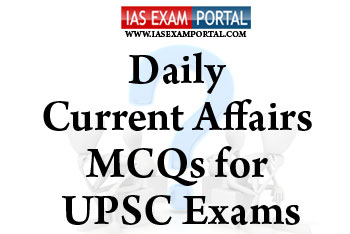Current Affairs MCQ for UPSC Exams - 15 October 2019

Current Affairs MCQ for UPSC Exams - 15 October 2019
Q1. Which of the following statements regarding theGraded Response Action Plan (GRAP) stands true ?
1) The Graded Response Action Plan to curb air pollution in Delhi-NCR will
come into force proactively rolling out stricter measures depending on the need
to discourage private vehicles on roads, stop entry of trucks, use of diesel
generators, and closing brick kilns and stone crushers.
2) Prepared by the Central Pollution Control Board and first implemented in
Delhi-NCR in 2017, the Graded Response Action Plan lists measures to curb air
pollution according to the severity of the situation.
3) However,GRAP measures does not include increasing bus and metro services,
hiking parking fees and stopping use of diesel gen-sets when the air quality
turns "poor".
a) 1 & 2only
b) 2 & 3 only
c) 1 & 3 only
d) all of the above
Q2. An AQI (Air Quality Index) between 0 and 50 is considered 'good', 51 and 100 'satisfactory', 101 and 200 'moderate', 201 and 300 'poor', 301 and 400 'very poor', and 401 and 500 'severe'.
Which of the following cities in India comes under the ‘good’ category ?
1) Thiruvananthapuram
2) Ahmedabad
3) Gandhinagar
4) Durgapur
5) Sirsa
a) 1,2 & 3 only
b) 1,4 & 5 only
c) 2,3 & 5 only
d) all of the above
Q3. India and Netherlands launched the second phase of the LOTUS-HR (Local Treatment of Urban Sewage streams for Healthy Re-useplant ) as a part of joint collaboration.
Which of the following statements regarding the same stands true ?
1) The project was initiated in July 2017 and aims to demonstrate a novel
holistic (waste) water management approach that will produce clean water which
can be reused for various purposes.
2) This pilot scale facility will employ multiple technologies so that the data
generated at the pilot scale becomes a tool-box of treatment technologies for
replication at other sites in Delhi as well as other parts of India where
similar drains exist.
3) The innovative pilot scale modular plant upon commissioning will treat
1,00,000 L sewage water per day and will showcase a self-sustaining model for
the end user.
a) 1 & 2only
b) 2 & 3 only
c) 1 & 3 only
d) all of the above
Q4. With respect to theDiscovered Small Field(DSF) policy recently mentioned by the petroleum ministry in the recently held India Energy Forum, which of the following statements stands true ?
1) The Government had approved the Discovered Small Field policy in 2015 with
its main objective to bring Discovered Small Fields to production at the
earliest so as to enhance the domestic production.
2) These areas has been discovered long back but the reserves could not be put
into production due to various reasons such as Isolated locations of oilfield;
Small size of hydrocarbon reserve; high development costs and constraint in
technology etc.
3) The new DSF policy is based on the principle of ‘ease of doing businesses’.
This policy is an outcome of a long consultation process between the government
and the industry.
a) 1 & 2only
b) 2 & 3 only
c) 1 & 3 only
d) all of the above
Q5. The Wetlabis a platform for young professionals and students to think
differently for innovative ideas to solve India’s urban water challenges and
contribute to cleaning up India’s rivers.
The intent of Wetlabis focussed on making best ideas becoming an input for
the realisation of the Water Experience Center that may further lead to turning
the project site into an attractive center for education and technology
demonstration for students, young professionals and creating opportunities for
startups.
It is part of the joint collaboration between India and which of the following countries ?
a) Sierra Leone
b) Comoros islands
c) Netherlands
d) Israel

